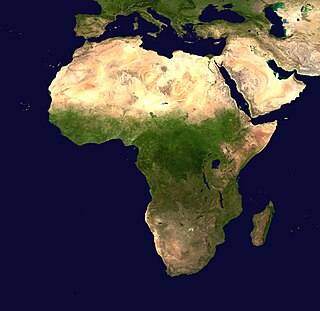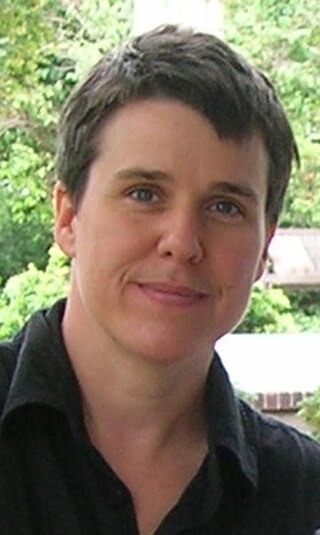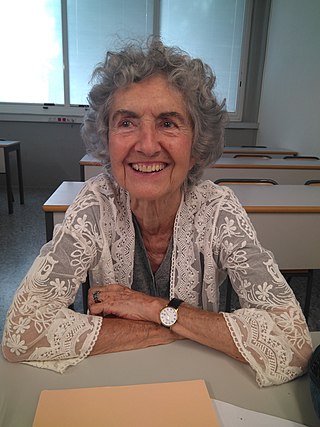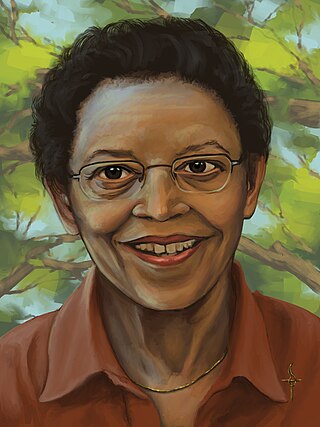
Feminist economics is the critical study of economics and economies, with a focus on gender-aware and inclusive economic inquiry and policy analysis. Feminist economic researchers include academics, activists, policy theorists, and practitioners. Much feminist economic research focuses on topics that have been neglected in the field, such as care work, intimate partner violence, or on economic theories which could be improved through better incorporation of gendered effects and interactions, such as between paid and unpaid sectors of economies. Other feminist scholars have engaged in new forms of data collection and measurement such as the Gender Empowerment Measure (GEM), and more gender-aware theories such as the capabilities approach. Feminist economics is oriented towards the goal of "enhancing the well-being of children, women, and men in local, national, and transnational communities."
Anarcha-feminism, also known as anarchist feminism or anarcho-feminism, is a system of analysis which combines the principles and power analysis of anarchist theory with feminism. It closely resembles intersectional feminism. Anarcha-feminism generally posits that patriarchy and traditional gender roles as manifestations of involuntary coercive hierarchy should be replaced by decentralized free association. Anarcha-feminists believe that the struggle against patriarchy is an essential part of class conflict and the anarchist struggle against the state and capitalism. In essence, the philosophy sees anarchist struggle as a necessary component of feminist struggle and vice versa. L. Susan Brown claims that "as anarchism is a political philosophy that opposes all relationships of power, it is inherently feminist".
Women's studies is an academic field that draws on feminist and interdisciplinary methods to place women's lives and experiences at the center of study, while examining social and cultural constructs of gender; systems of privilege and oppression; and the relationships between power and gender as they intersect with other identities and social locations such as race, sexual orientation, socio-economic class, and disability.
Transnational feminism refers to both a contemporary feminist paradigm and the corresponding activist movement. Both the theories and activist practices are concerned with how globalization and capitalism affect people across nations, races, genders, classes, and sexualities. This movement asks to critique the ideologies of traditional white, classist, western models of feminist practices from an intersectional approach and how these connect with labor, theoretical applications, and analytical practice on a geopolitical scale.
A transnational feminist network (TFN) is a network of women's groups who work together for women's rights at both a national and transnational level. They emerged in the mid-1980s as a response to structural adjustment and neoliberal policies, guided by ideas categorized as global feminism. TNF's are composed of representatives from a variety of NGO's from around the globe. These representatives then come together at conferences, such as the United Nations World Conference on Women and The NGO Forum in China.
Gender mainstreaming is the public policy concept of assessing the implications for people of different genders of a planned policy action, including legislation and programmes. Mainstreaming offers a pluralistic approach that enhances diversity among people of different genders.
Global feminism is a feminist theory closely aligned with post-colonial theory and postcolonial feminism. It concerns itself primarily with the forward movement of women's rights on a global scale. Using different historical lenses from the legacy of colonialism, global feminists adopt global causes and start movements which seek to dismantle what they argue are the currently predominant structures of global patriarchy. Global feminism is also known as world feminism and international feminism.

African feminism includes theories and movements which specifically address the experiences and needs of continental African women. From a western perspective, these theories and movements fall under the umbrella label of Feminism, but this categorization is misleading for many branches of African "feminism". African women have been engaged in gender struggle since long before the existence of the western-inspired label "African feminism," and this history is often neglected. Despite this caveat, this page will use the term feminism with regard to African theories and movements in order to fit into a relevant network of Wikipedia pages on global feminism. Because Africa is not a monolith, no single feminist theory or movement reflects the entire range of experiences African women have. African feminist theories are sometimes aligned, in dialogue, or in conflict with Black Feminism or African womanism. This page covers general principles of African feminism, several distinct theories, and a few examples of feminist movements and theories in various African countries.
Feminist psychology is a form of psychology centered on social structures and gender. Feminist psychology critiques historical psychological research as done from a male perspective with the view that males are the norm. Feminist psychology is oriented on the values and principles of feminism.

Ara Wilson is a university professor and author.

Lourdes Benería is a Spanish–American economist. She was Professor Emerita at Cornell University's Department of City and Regional Planning. The author and editor of many books and articles, her work has concentrated on topics having to do with labor economics, women's work, the informal economy, Gender and development, Latin American Development and globalization. Before Cornell, she taught at Rutgers University and has given courses in other international centers. She worked at the ILO for two years and has collaborated with other UN organizations, such as UNIFEM and UNDP, and with several NGOs. She obtained her PhD at Columbia University in 1975.
Gender and development is an interdisciplinary field of research and applied study that implements a feminist approach to understanding and addressing the disparate impact that economic development and globalization have on people based upon their location, gender, class background, and other socio-political identities. A strictly economic approach to development views a country's development in quantitative terms such as job creation, inflation control, and high employment – all of which aim to improve the ‘economic wellbeing’ of a country and the subsequent quality of life for its people. In terms of economic development, quality of life is defined as access to necessary rights and resources including but not limited to quality education, medical facilities, affordable housing, clean environments, and low crime rate. Gender and development considers many of these same factors; however, gender and development emphasizes efforts towards understanding how multifaceted these issues are in the entangled context of culture, government, and globalization. Accounting for this need, gender and development implements ethnographic research, research that studies a specific culture or group of people by physically immersing the researcher into the environment and daily routine of those being studied, in order to comprehensively understand how development policy and practices affect the everyday life of targeted groups or areas.
Feminism in Thailand is perpetuated by many of the same traditional feminist theory foundations, though Thai feminism is facilitated through a medium of social movement activist groups within Thailand's illiberal democracy. The Thai State claims to function as a civil society with an intersectionality between gender inequality and activism in its political spheres.
Indigenous feminism is an intersectional theory and practice of feminism that focuses on decolonization, Indigenous sovereignty, and human rights for Indigenous women and their families. The focus is to empower Indigenous women in the context of Indigenous cultural values and priorities, rather than mainstream, white, patriarchal ones. In this cultural perspective, it can be compared to womanism in the African-American communities.

Latin American feminism is a collection of movements aimed at defining, establishing, and achieving equal political, economic, cultural, personal, and social rights for Latin American women. This includes seeking to establish equal opportunities for women in education and employment. People who practice feminism by advocating or supporting the rights and equality of women are feminists.

Peggy Antrobus is a feminist activist, author, and scholar from the Caribbean. She served as Advisor on Women's Affairs to the government of Jamaica, and as United Nations advisor to the Barbados Ministry of Social Transformation. She is a founder member of several feminist organisations, including the Caribbean Association for Feminist Research and Action (CAFRA), the global South feminist network Development Alternatives with Women for a New Era (DAWN), and the International Gender and Trade Network (IGTN). She is the author of The Global Women's Movement: Origins, Issues and Strategies.
Gita Sen is an Indian feminist scholar. She is a Distinguished Professor & Director at the Ramalingaswami Centre on Equity & Social Determinants of Health, at the Public Health Foundation of India. She is also an adjunct professor at Harvard University, a professor emeritus at the Indian Institute of Management Bangalore, and the General Coordinator of DAWN.
Rafia Zakaria is a Pakistani-American attorney, feminist, journalist, and author. Zakaria is a columnist for Dawn. She has written for The Nation, Guardian Books, The New Republic, The Baffler, Boston Review, and Al Jazeera. In 2021, she published a book titled Against White Feminism, in which she critiques the emphasis that conventional feminist thought places on the experiences of white women while excluding women of color.
Achola Pala is a Kenyan anthropologist, sociologist, and women's policy specialist. Born in a small town in western Kenya, Pala completed her education at the University of East Africa and Harvard. She worked as a researcher with the University of Nairobi and later was the head of social science research at the International Centre of Insect Physiology and Ecology. Concerned about women's empowerment and the impact of public policies on women, she worked with numerous divisions of the United Nations including UNESCO, UNICEF, the United Nations University, and the World Food Council, before becoming chief of the Africa Section of UNIFEM. She also participated in numerous conferences on women including the 1980, 1985, and 1995 World Conferences on Women. She worked with Esther Jonathan Wandeka to gain governmental support for the 1985 conference held in Nairobi and was instrumental in introducing the peace torch at the 1995 Beijing conference.
Neuma Aguiar was a Brazilian sociologist and one of the women who introduced women's studies in the country. After earning her undergraduate degree at the Pontifical Catholic University of Rio de Janeiro in 1960, she completed a master's degree in sociology and anthropology at Boston University and a PhD at Washington University in St. Louis, Missouri. Returning to Brazil, from 1972 to 1996 she worked at the Instituto Universitário de Pesquisas do Rio de Janeiro, the research institute of the Universidade Candido Mendes. From 1978, she taught a women's study course at the institute, which mainly focused on women's impact on the economy. Between 1996 and 2008, she was a full professor at the Federal University of Minas Gerais, both teaching women's studies and directing the Center for Quantitative Research in Social Sciences.









